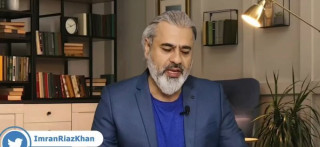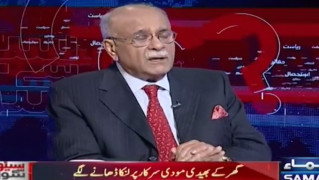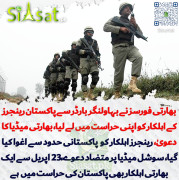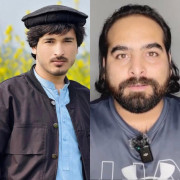Pakistani1947
Chief Minister (5k+ posts)

Question: There is a woman who claims to worship Allah sincerely, and that whilst she is asleep she is visited by a man wearing a white gown who walks around her, then the next morning she predicts things that are almost true. The people know of her and they have started to visit her and they say that she has knowledge of the unseen, but no one knows the unseen except Allah. What is the ruling on this woman? What do you advise us to do?
Praise be to Allah
Answer:
It is not permissible for anyone to claim to have knowledge of the unseen. The one who makes such a claim is a kafir (disbeliever). And it is not permissible to believe that anyone has knowledge of the unseen. The one who believes that is also a kafir.
Allah has told us that the Prophet (peace and blessings of Allah be upon him) does not have knowledge of the unseen, and that the jinn do not have knowledge of the unseen.
What we are referring to here is the unseen in absolute terms, which no one knows except Allah. As for the relative unseen – which some people know and others do not – some people may find a way to know this, so we have to find out how they know it; some may find out by spying and some may find out through the jinn. Both are ways which are forbidden for us to use.
Shaykh Ibn ‘Uthaymeen (may Allah have mercy on him) was asked:
Do the jinn have knowledge of the unseen?
He replied:
The jinn do not have knowledge of the unseen because Allah says (interpretation of the meaning):
“Say: None in the heavens and the earth knows the Ghaib (unseen) except Allah.” [27:65]
کہہ دے الله کے سوا آسمانوں اور زمین میں کوئی بھی غیب کی بات نہیں جانتا
“Then when We decreed death for him [Sulayman], nothing informed them (jinn) of his death except a little worm of the earth which kept (slowly) gnawing away at his stick. So when he fell down, the jinn saw clearly that if they had known the unseen, they would not have stayed in the humiliating torment” [34:14]
پھر جب ہم نے اس پر موت کا حکم کیا تو انہیں ا سکی موت کا پتہ نہ دیا مگر گھن کے کیڑے نے جو اس کے عصا کو کھا رہا تھا پھر جب گر پڑا تو جنوں نے معلوم کیا کہ اگر وہ غیب کو جانتے ہوتے تو اس ذلت کے عذاب میں نہ پڑے رہتے
So whoever claims to have knowledge of the unseen is a kafir, and whoever believes the one who claims to have knowledge of the unseen is also a kafir, because Allah says (interpretation of the meaning):
“Say: None in the heavens and the earth knows the Ghaib (unseen) except Allah.” [27:65]
کہہ دے الله کے سوا آسمانوں اور زمین میں کوئی بھی غیب کی بات نہیں جانتا
No one knows what is unseen in the heavens and the earth except Allah alone. Those who claim to have knowledge of the unseen future are all fortunetellers, and it is proven that the Prophet (peace and blessings of Allah be upon him) said: “Whoever goes to a fortuneteller and asks him (about anything), his prayer will not be accepted from him for forty days.” And if he believes him then he is a kafir because if he believes that he has knowledge of the unseen, then he has disbelieved in the words of Allah (interpretation of the meaning):
“Say: None in the heavens and the earth knows the Ghaib (unseen) except Allah.” [27:65].
[Majmoo’ Fatawa al-Shaykh Ibn ‘Uthaymeen]
And Shaykh Ibn ‘Uthaymeen (may Allah have mercy on him) was asked about the ruling on one who claims to have knowledge of the unseen. He replied:
The ruling on one who claims to have knowledge of the unseen is that he is a kafir, because he has disbelieved in Allah. Allah says (interpretation of the meaning):
“Say: None in the heavens and the earth knows the Ghaib (unseen) except Allah, nor can they perceive when they shall be resurrected.” [27:65]
If Allah has commanded His Prophet Muhammad (peace and blessings of Allah be upon him) to proclaim to all that no one in the heavens or on earth has knowledge of the unseen except Allah, then whoever claims to have knowledge of the unseen has denied what Allah has told us here.
We say to them: How can you possibly have knowledge of the unseen when the Prophet (peace and blessings of Allah be upon him) did not have knowledge of the unseen? Are you better or the Messenger (peace and blessings of Allah be upon him)? If they say, “We are better than the Messenger” then they become kafirs by saying that. If they say, “He is better,” then why was the unseen concealed from him but you have knowledge of it?? Allah says of Himself (interpretation of the meaning):
“(He Alone is) the All‑Knower of the Ghayb (unseen), and He reveals to none His Ghayb (nseen). Except to a Messenger (from mankind) whom He has chosen (He informs him of the unseen as much as He likes), and then He makes a band of watching guards (angels) to march before him and behind him.” [72:26-27]
وہ غیب جاننے والا ہے اپنے غائب کی باتوں پر کسی کو واقف نہیں کرتا
مگر اپنے پسندیدہ رسول کو پھراس کے آگے اور پیچھے محافظ مقرر کر دیتا ہے
مگر اپنے پسندیدہ رسول کو پھراس کے آگے اور پیچھے محافظ مقرر کر دیتا ہے
The second verse attests to the kufr (disbelief) of the one who claims to have knowledge of the unseen. And Allah commanded His Prophet (peace and blessings of Allah be upon him) to announce to all (interpretation of the meaning):
“Say (O Muhammad): I don’t tell you that with me are the treasures of Allah, nor (that) I know the unseen; nor I tell you that I am an angel. I but follow what is revealed to me.”[6:50]
کہہ دو میں تم سے یہ نہیں کہتا کہ میرے پاس الله کے خزانے ہیں اور نہ میں غیب کا علم رکھتا ہوں اور نہ یہ کہتا ہوں کہ میں فرشتہ ہوں میں تو صرف اس وحی کی پیروی کرتا ہوں جو مجھ پر نازل کی جاتی ہے کہہ دو کیا اندھا اور آنکھوں والا دونوں برابر ہو سکتے ہیں کیا تم غور نہیں کرتے
[Majmoo’ Fatawa al-Shaykh Ibn ‘Uthaymeen]
[Majmoo’ Fatawa al-Shaykh Ibn ‘Uthaymeen]
The one who predicts the future is called a kahin (fortuneteller, soothsayer), and it is not permissible to ask questions of such a person or to go to him or her. If their predictions are sometimes correct, that is either a coincidence or because the jinn have intercepted the news and conveyed it to the fortuneteller, but they add a hundred lies to it.
It was narrated that ‘Aishah (may Allah be pleased with her) said: Some people asked the Messenger of Allah (peace and blessings of Allah be upon him) about fortunetellers. He said: “They are nothing.” They said: “O Messenger of Allah, sometimes they tell us something and it is true.” The Messenger of Allah (peace and blessings of Allah be upon him) said: “That is a word of the truth that they learn from the jinni which he whispers into the ear of his familiar, but they mix a hundred lies with it.” [al-Bukhari, Muslim].
Al-Hafiz ibn Hajar said:
Al-Qurtubi said: During the Jahiliyyah (pre-Islamic days of ignorance) they used to consult the fortunetellers about events and rulings, and follow what they said. Then the fortunetellers stopped when the Prophet (peace and blessings of Allah be upon him) was sent. But there are still some who resemble them. It is forbidden to go to them, so it is not permissible to go to them or to believe them.
In the version narrated by Yoonus the phrase “sometimes they tell us something and it is true” appears as “they tell something and it turns out to be true.” This phrase has confused the questioner because of the general meaning of the phrase “They are nothing”, which he has understood to mean that they never get anything right. But the Prophet (peace and blessings of Allah be upon him) commented that although they sometimes coincidentally get things right, it is never completely right for it is always contaminated with many lies.
Al-Khattabi said: The Prophet (peace and blessings of Allah be upon him) explained that the reason why the fortuneteller sometimes gets it right is that the jinni tells him of something that he has heard by eavesdropping on the angels, and he adds lies to that to embellish what he heard. So occasionally he gets it right but usually it is wrong. [Fath al-Bari].
With regard to what is mentioned in the question of what this woman sees in her dreams, such dreams are not to be taken as evidence concerning rulings of sharee’ah (Islamic law), let alone whatever they may indicate that goes against any matter of ‘aqeedah (belief) that is confirmed in the texts of Islam. Whatever she sees in her dreams is to be regarded as the shaytan’s toying with her and taking advantage of her ignorance.
For more information on the rulings on what is seen in dreams, please see questions no. 25768[FONT=wf_segoe-ui_light], [/FONT]6537 and23367[FONT=wf_segoe-ui_light].[/FONT]
And Allah knows best.
Source
Last edited:































